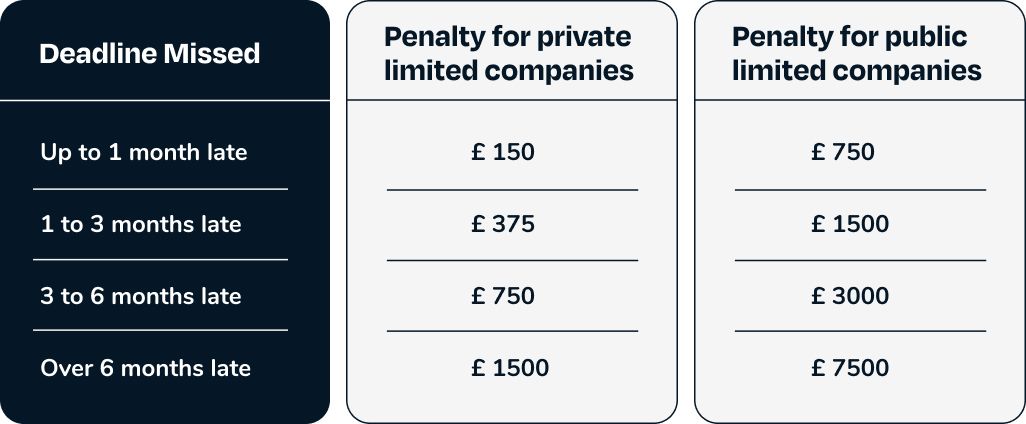Running a company in the UK can be an exciting adventure, especially when you have just started out. But the truth of course is that it comes with a lot of responsibilities including having to file your company accounts with the government.
As a limited company in the UK, you are legally required to file your company accounts, and that's on top of your tax return. While the thought of filing taxes and company accounts can seem daunting and overwhelming as a new business owner, it can be easily handled with the right information and support. It’s an important part of keeping your business running and in good standing in the UK.
So, if you have just started out or even have an already hired accountant, we have got a handy guide for you to file your company accounts. Here we will walk you through the steps of filing company accounts and how you can ease this process to avoid fines.
What are the company's annual accounts?
Simply put, a company’s annual accounts are financial statements that highlight the financial position and your company’s performance over a specific period of time. These statements typically include your balance sheet, profit and loss and cash flow statement. These accounts are also known as statutory accounts and serve as an important document in filing company accounts with the government.
These accounts can also come in handy if the business owners, investors or stakeholders wish to evaluate the company’s financial health and performance over the years. Now let’s understand what’s included in company accounts.
Let’s assume you own a small business which sells handmade candles. In such a case, by the end of the financial year, you will need to prepare your company accounts. This will involve creating your financial transactions, cashflows etc. which will give you an outlook on your finance over the accounting year.
Here's what your company accounts might include:
Balance Sheet: This statement shows your company's assets, liabilities, and equity at a specific point in time. Let's say on the last day of your financial year, your assets are worth £50,000, your liabilities are £20,000, and your equity is £30,000. This would mean that your company's assets are worth more than its liabilities, giving you a positive net worth.
Profit and Loss Account: This statement shows your company's revenue, expenses, and profits over a specific period of time. Let's say your business made £100,000 in revenue over the year, and your expenses totalled £80,000. This would mean your business made a profit of £20,000 for the year.
Cash Flow Statement: This statement shows the inflow and outflow of cash during a period. Let's say your business had cash inflows of £120,000 over the year from sales and investments, but also had cash outflows of £100,000 for expenses and investments. This would mean your business had a positive cash flow of £20,000 for the year.
In all, you will need these three statements to get a complete picture of your company’s financial health. By preparing and reviewing these accounts every year, you can not only keep a track of your business’s progress but also make informed decisions about its future!
Due dates for filing company accounts
As a UK limited company, you are expected to file your annual accounts with the Companies House and HMRC every year on time. But when exactly is the deadline for doing that?
Well, there is no specific deadline to file your company accounts. Your filing deadline depends on your ARD and you simply need to file your annual accounts at the end of your company’s financial year.
Usually, you are allowed 9 months to deliver your accounts to the Companies House from your accounting reference date (ARD). Your ARD means the end of your financial year.
So, when you incorporate a company, your financial year starts on that day itself and your first ARD will be a year later, on the last day of the month you established it. For example, if you establish your company on 8th August 2022, your first ARD will be on 31st August 2023, and then on 31st August every year. If your business is new, your first deadline to file accounts will be after 21 months (first financial year plus 9 months). And if you are an established business, then you need to file 9 months after your company's financial year ends.
Companies House also allows businesses to change their ARD for the current financial year or the one previous. In some cases, you also might need more time to file your accounts. In such a case, you may be able to apply for an extension. But, make sure you are filing accounts before the deadlines to avoid penalties and additional fees.
Who needs to file company accounts
As we mentioned earlier, all UK limited companies are liable to file company accounts every year with the Companies House. This includes all private limited companies (Ltd), public limited companies (PLCs), and limited liability partnerships (LLPs).
Additionally, if you are running a micro-entity, small company or dormant company, you will still be required to file your company accounts where you may be eligible for reduced reporting requirements or exemptions.
For example, you may be able to file simpler accounts and would be considered for extended timelines.
But it's important to know that any failures to file your company accounts can result in penalties and fines similar to the ones for large companies. So even if you are eligible for extensions, it’s smart to understand your reporting requirements and file your accounts on time!
Annual accounts: small companies and micro-entities
Small companies and micro entities in the UK have distinct requirements to prepare and file their annual accounts.
You need to understand if your company falls under these criteria and if you will be able to take the advantage of simplified accounting rules set by the government.
According to the UK government, if you are a small company, then:
- Your turnover is £10.2 million or less
- Your balance sheet has £5.1 million or less on it
- Your company has less than or equal to 50 employees
Micro-entities are defined as having two of the following:
- Your turnover of £632,000 or less
- Your balance sheet has either £316,000 or less
- Your company has less than or equal to 10 employees
The good thing about being a small business and micro-entity is that you can ease your process by preparing and filing abbreviated accounts. These accounts must include a balance sheet which shows the financial value of your owned assets and liabilities. This balance sheet can be simpler and more straightforward for micro-entities.
Small companies also need to prepare a profit and loss account which will show your company’s sales, costs of running a business and any profit or loss made during the financial year. On the other hand, micro-entities may not need to submit these profit and loss accounts.
Both, small companies and micro-entities may choose to not include certain information in their accounts - such as an auditor’s or director’s report.
In both cases, statutory accounts need to meet the accounting standards:
- International Financial Reporting Standards
- New UK Generally Accepted Accounting Practice
While everything can be a lot, understanding the requirements for annual accounts can ensure that you are meeting your legal obligations!
How to prepare company accounts as a small company
If you're running a small company or a micro-entity, you may be able to prepare simpler accounts when it's time to file your company accounts.
First things first, statutory accounts for small companies include a balance sheet, profit and loss account, and some notes. But, if you're a micro-entity, you might not need to provide a profit and loss account.
If you qualify as a small company or micro-entity, you can use an exemption that allows you to skip the audit process and choose what to include in your accounts. For micro-entities, you can just prepare a balance sheet that meets the statutory minimum requirements.
It's important to note that your statutory accounts need to meet accounting standards such as the International Financial Reporting Standards or the New UK Generally Accepted Accounting Practice.
With these things in mind, you should be able to prepare your company accounts with ease.

Filing for dormant businesses
Now let’s understand what you are required to do if you run a dormant business. So if your business is not trading and does not have any kind of income, it is considered a “dormant” business. But, even if you are running a dormant business, you need to file your company accounts with Companies House.
You don’t have to inform Companies House if your dormant company starts trading again, but you will be required to file accounts on the due date. If there’s a situation where you no longer want to run a dormant company, you can close it using the Companies House online service.
It’s worth noting that there are some transactions that are not considered “significant” and will not affect your company’s dormant status - such as filing fees paid to Companies House, penalties for late filing, and money paid towards shares during the company’s incorporation.
Just remember, if you are not filing your dormant accounts as per the deadlines, you will be hit with penalties. So, it’s important to keep the deadlines at the back of your pocket.

How to file your company accounts
Some companies prefer hiring an accountant to file the company accounts, but if you are also filing your company accounts by yourself, then here’s what to do:
You need to send accounting documents to Companies House if you are either
- Established outside European Economic Area
- Established in an EEA country and required to file accounts there
Gather your company's financial records
Before you can file your accounts, you'll need to make sure that you have all of your company's financial records for the year. Gather all your records that we mentioned earlier to start filing your accounts. You need to include these documents:
- The accounts for the financial year
- Director's annual report
- A completed OS AA01 form
- Any auditor's report, if applicable
Log in to Companies House: Now, go to the Companies House website and log in to your account. If you don't have an account yet, you will need to register and follow the steps to be eligible to file your accounts.
Choose the right form: Depending on your company's size and filing requirements, you'll need to choose the appropriate form for filing your accounts. Here’s some information you can find about it.
Fill out the form: The form will ask for information about your company, such as your registered office address, company number, and financial year-end date. You'll also need to upload your financial statements in the required format.
Make the fee payment: You need to send a £20 fee to Companies House. If you are using cheques to make the payment- it should be payable to 'Companies House.'
That’s it! As long as you have your financial records in order and you follow the steps, you should be able to file your accounts with ease.
Something more to know about filing accounts
The best thing about filing your accounts with Companies House is that you can also do this online. Although this can be done on paper as well, if you are more comfortable doing it that way, it can take longer for HMRC to process physical copies.
If you are a small company or micro-entity, you are more in luck! You can use one of the government’s online tools - the Company Accounts and Tax Online (CATO) service. This allows you to submit your accounts data to both HMRC and Companies House in one go! It’s quite handy and convenient if you are managing your accounts yourself.
Now that you know how to file your accounts, it’s totally your choice if you want to do this by yourself or get an accountant to take care of them. While many businesses prepare and file their accounts by themselves, we understand that you have a lot to take care of! And so, it’s worth considering hiring a professional who can manage your filing process while taking care of all the deadlines and complexities, as they arise.
What are the penalties for late filing
One of the main reasons to avoid any delays in filing your accounts is the penalties associated with it. Here are some penalties that you might come across if you end up avoiding deadlines:

Note that these penalties are per filing, meaning you may be charged separately for late filing of your annual accounts and your company tax return.
Additionally, if your accounts are filed late in 2 successive financial years, your penalties will be doubled and you may even face legal action. It's important to file your accounts on time or apply for an extension if necessary to avoid these penalties.
It's worth noting that there are some circumstances where you may be able to appeal or have penalties waived, such as if you have a valid reason for the late filing, but this is assessed on a case-by-case basis.
Who is responsible to file company accounts
So, now that you know how to proceed with filing accounts, the next big question is “who exactly is responsible in the company to file these accounts?”
Well, usually company directors are in charge to make sure their accounts are being submitted on time and in the right format. As the owner of the company, it's your job to ensure that all your financial transactions and plans are in order. Although you can choose to hire a professional to get the work done, ultimately it is up to you to make sure everything is in place
A few last words…
Whether you are filing your accounts through the software or seeking the help of an accountant, you will get help to streamline your records.
If you are still unsure and want to double-check the requirements, you can look up the regulations on the government's website. Just remember that your accounts should comply with the UK's accounting standards.
We really hope that this guide was helpful to help you get a better grasp on how to file your company accounts. Don't forget that it's super important to keep yourself informed about the company's financial future!
If you are a new business owner or running a small business in the UK, keep following wamo to get more tips on running a successful business and making better financial decisions.






